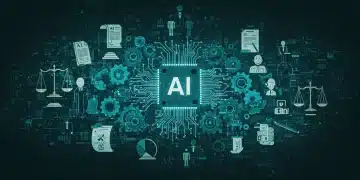US AI Ethics Initiatives: Funding & Compliance in 2025

In 2025, US Government AI ethics initiatives are expected to focus on substantial funding and stringent compliance measures, aiming to ensure responsible and ethical development and deployment of artificial intelligence technologies across various sectors.
As artificial intelligence (AI) continues to rapidly evolve, the US government is placing increasing emphasis on ethical considerations and responsible AI development. This article explores the US Government AI Ethics Initiatives: A Comprehensive Overview of Funding and Compliance for 2025, providing insights into the funding allocated to these initiatives and the compliance measures that organizations will need to adhere to.
Understanding the US Government’s Commitment to AI Ethics
The US government recognizes that AI has huge potential to provide value to society. It also understands the risks of AI in the absence of careful consideration to its ethics. The government is showing its commitment by funding and putting rules into place to make sure AI is being used ethically.
The Importance of AI Ethics
AI ethics concerns principles and guidelines that promote responsible AI development and deployment.
- Ensuring fairness and avoiding bias in AI algorithms.
- Protecting privacy and data security.
- Promoting transparency and accountability in AI systems.
These practices are crucial for maintaining public trust and maximizing the benefits of AI while minimizing potential harms.
The government is committed to creating funding and putting rules into place to guide individuals and businesses in using ethical AI.

Key AI Ethics Initiatives and Their Objectives
Several key initiatives demonstrate the US government’s dedication to AI ethics. These initiatives aim to provide a framework for ethical AI development and use across various industries.
National AI Initiative Office
The National AI Initiative Office coordinates AI-related activities across the federal government, supporting research, policy development, and international cooperation.
- Promoting AI innovation while addressing ethical, legal, and societal implications.
- Enhancing public understanding of AI.
- Fostering a skilled AI workforce.
The US government’s continued focus and dedication to these initiatives is expected to provide funding for a future that uses AI responsibly and ethically.
Funding Allocation for AI Ethics in 2025
In 2025, significant funding is expected to be allocated to AI ethics initiatives. This funding aims to support research, development, and implementation of ethical AI practices.
Areas Receiving Funding
Several key areas will receive targeted investments of funding. These areas will help to ensure that AI ethics continue to be emphasized and developed.
- Research and Development: Funding will support the development of tools and methodologies for evaluating and mitigating bias in AI systems.
- Education and Training: Initiatives will focus on training AI professionals in ethical considerations.
- Compliance Frameworks: Funding will support the creation of clear guidelines and standards for AI ethics, helping organizations ensure their AI practices align with ethical standards.
These investments reflect the government’s focus on a future for AI that is ethical and responsible.

Compliance Measures and Regulatory Landscape
Compliance with AI ethics standards is becoming increasingly important for organizations. The regulatory landscape is evolving to ensure AI systems are developed and deployed responsibly.
Key Compliance Areas
Organizations will need to address compliance in several key areas to avoid potential penalties and maintain public trust.
- Data Privacy: Ensuring compliance with data protection regulations, such as GDPR and CCPA, when using AI systems.
- Algorithmic Transparency: Providing clear explanations of how AI algorithms work and how they make decisions.
- Bias Mitigation: Implementing measures to identify and mitigate bias in AI algorithms to ensure fairness and equity.
Organizations can ensure they are compliant by partnering with third parties. These third parties can audit and evaluate their AI systems, ensuring those systems are ethical, fair, and respectful to individual privacy.
Industry Impacts and Ethical Considerations
The US government’s AI ethics initiatives will have a profound impact on various industries. Organizations must integrate ethical considerations into their AI strategies to remain competitive and responsible.
Healthcare
AI-driven diagnostics and personalized treatment plans must be developed and deployed with careful attention to patient privacy and data security.
Education
AI tools for personalized learning must ensure fairness and avoid perpetuating biases. All people should have equal access to AI educational tools.
Finance
AI algorithms used in lending and credit scoring must be transparent and free from discriminatory practices. AI should not discriminate against any person, group, or protected class.
By addressing ethical considerations and complying with regulatory requirements, organizations can foster public trust, drive innovation, and advance the responsible integration of AI technologies.
Preparing for 2025: Steps for Organizations
To prepare for the AI ethics landscape in 2025, organizations should take proactive steps to align their AI practices with ethical standards and regulatory requirements.
Assess Current AI Practices
Conduct a thorough assessment of existing AI systems to identify potential ethical risks and compliance gaps. Organizations should develop an internal ethics review board to assess the risks of AI that they are developing. This review board should also create guidelines for ethical AI development.
Invest in Education and Training
Provide employees with comprehensive training on AI ethics, data privacy, and algorithmic transparency. Creating awareness about these issues is crucial at all levels of the organization. Executives must set the tone for ethical AI development.
Develop Ethical Guidelines and Standards
Establish clear ethical guidelines and standards for AI development and deployment. Work with legal, compliance, and ethics units to ensure their AI guidelines and standards are acceptable, ethical, and responsible.
By taking these preparatory steps, organizations can effectively navigate the evolving AI landscape, strengthen their competitive advantage, and contribute to the responsible and ethical advancement of AI technologies.
| Key Aspect | Brief Description |
|---|---|
| 💡 AI Ethics | Principles for responsible AI development and use. |
| 💰 Funding | Investment in research, education, and compliance. |
| 🔒 Compliance | Adherence to data privacy and transparency. |
| ⚖️ Regulation | Government oversight and industry standards. |
Frequently Asked Questions
▼
AI ethics initiatives are programs that focus on ensuring AI systems are developed and used in an ethical and responsible way, prioritizing fairness, accountability, and transparency.
▼
In 2025, there is significant funding allocated to AI ethics initiatives, supporting research, education, and the development of compliance frameworks to manage AI ethically.
▼
Compliance measures in 2025 will focus on ensuring data privacy, providing algorithmic transparency, and mitigating bias in AI algorithms to promote fairness and equity.
▼
AI ethics initiatives will significantly impact industries by requiring ethical considerations in AI strategies, enhancing public trust, and ensuring responsible technology integration.
▼
Organizations can prepare by assessing AI practices, investing in AI ethics education, and establishing ethical guidelines to ensure compliance and a responsible approach.
Conclusion
The US Government AI Ethics Initiatives for 2025 emphasize the importance of funding and compliance in ensuring AI technologies are developed and implemented ethically and responsibly. Understanding these initiatives and proactively preparing for them is critical for organizations across various industries.





